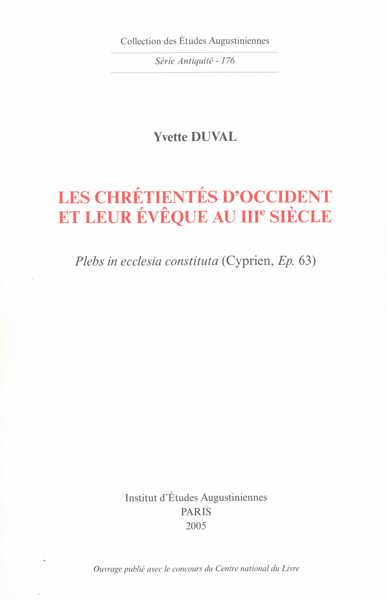
Augustin, lecteur et interprète du livre d’Isaïe
Nicolas Potteau
- Pages: 600 p.
- Size:165 x 250 mm
- Language(s):French, Latin
- Publication Year:2025
- € 85,31 EXCL. VAT RETAIL PRICE
- ISBN: 978-2-85121-338-9
- Paperback
- Available
Widely used by the authors of the New Testament, Isaiah is the prophet most quoted by Augustine. This book addresses the relationship between Augustine and the Book of Isaiah from the perspective of a reciprocal work: how did Augustine read, understand, and use this prophetic book, and how, in return, did the Book of Isaiah influence the Augustinian Philosophy and Theology? Isaiah 7:9, “if you do not believe, you will not understand”, thus helps the Bishop of Hippo to think about the relationship between faith and reason. For Augustine, Isaiah is the prophet of Christ par excellence, but also the prophet of the Church. Here he reads the prophecies of the reaction of the people of Israel who do not recognize the Messiah, the conversion of pagan nations, and the advent of a universal Church composed of saints and sinners. Isaiah is also one of the prophets of the end of time, and Augustine discerns the different phases of eschatological times within it. The book also compares Augustine’s interpretation with that of the Latin ecclesiastical authors who preceded him, allowing for a perspective on Augustinian exegesis and an evaluation of its originality.
Abondamment utilisé par les auteurs du Nouveau Testament, Isaïe est le prophète le plus cité par Augustin. Le présent ouvrage aborde la relation entre Augustin et le livre d’Isaïe sous l’angle d’un travail réciproque : comment Augustin a-t-il lu, compris, utilisé ce livre prophétique et comment, en retour, le livre d’Isaïe a-t-il travaillé la philosophie et la théologie augustinienne ? Is 7,9, « si vous ne croyez pas, vous ne comprendrez pas », permet ainsi à l’évêque d’Hippone de penser les rapports entre la foi et la raison. Isaïe est pour Augustin le prophète du Christ par excellence, mais aussi celui de l’Église. Il y lit des annonces de la réaction du peuple d’Israël qui ne reconnaît pas le messie, de la conversion des nations païennes ou de l’avènement d’une Église universelle composée des saints et de pécheurs. Isaïe est enfin un des prophètes de la fin des temps et Augustin y discerne les différentes phases des temps eschatologiques. L’ouvrage compare également l’interprétation augustinienne à celle des auteurs ecclésiastiques latins qui l’ont précédé, ce qui permet de mettre en perspective l’exégèse augustinienne et d’en évaluer l’originalité.
Remerciements
Abréviations
Introduction
Première partie. La lecture du livre d’Isaïe
Chapitre I. Le texte d’Augustin
Chapitre II. Les voies d’accès au livre d’Isaïe et à son utilisation
Chapitre III. Is 7, 9 : Croire pour comprendre
Chapitre IV. Les règles d’interprétation de l’Écriture
Deuxième partie. L’interprétation des oracles
Chapitre V. Isaïe, prophète du Christ
Chapitre VI. Israël et l’Église
Chapitre VII. La conversion des nations
Chapitre VIII. L’Église universelle et sainte
Chapitre IX. Isaïe, prophète de l’eschatologie
Conclusion
Annexes
Indices




